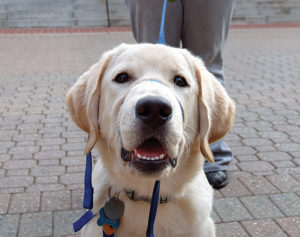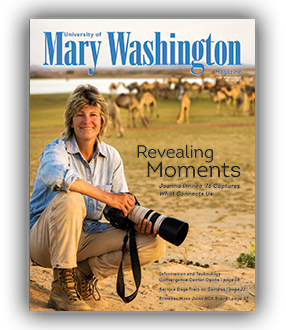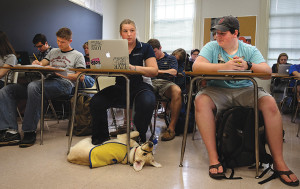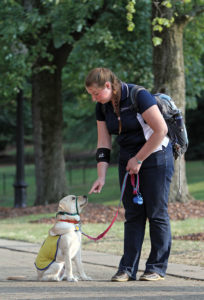There was a new student in the Tuesday afternoon principles of management class this fall.
Meet Farrah, a Labrador and golden retriever mix and service dog in training. Farrah is one of two dogs in the University of Mary Washington’s chapter of Canine Companions for Independence started this fall and founded by UMW juniors Rebekah Selbrede and Abigail Hannell.
Having grown up with dogs, both women were eager to put their love of animals toward a meaningful cause. After a year of planning, Selbrede and Hannell traveled to New York in June to pick up Dragon and Farrah. As service dogs in training, Dragon and Farrah will eventually be paired with people in need of help with a physical or hearing disability.
Guiding pups to become service animals isn’t the same as having a pet. “It’s like having a child,” Selbrede said. “It’s a big responsibility to train these dogs.”

Service-dog trainers ask a lot of their assigned Labrador-golden retriever puppies, including Dragon.
Over the next year and a half, Dragon and Farrah will learn 30 basic commands, house training, and socialization. Busy college campuses create the perfect training ground for socialization skills, but it’s hard to get students to ask before interacting with the dogs.
“When Dragon has his cape on, he’s working,” said Selbrede, a psychology major from Chesapeake, Virginia. “If students pet him while he’s learning, it can be a distraction.”
Hannell, a business major from Lynchburg, and Farrah arrive on campus at 7:30 on Tuesday and Thursday mornings for a full day of classes that doesn’t end until 5 p.m. “She will play with her chew toy and sleep in class. Sometimes she starts snoring, and I have to nudge her to wake her back up,” Hannell said. After the long day, the cape comes off and it’s well-deserved playtime at home.
Within a few weeks, Selbrede realized 4-month-old Dragon wasn’t quite ready for college and back-to-back classes. “He has about a one-hour attention span but has trouble doing more than that,” Selbrede said. She and CCI coordinators knew he needed to progress more slowly, and he was reassigned to another trainer.
Canine Companions’ trained dogs usually serve for about eight years before retiring to be pets. The goal of the nonprofit organization is to enhance the lives of people with disabilities by providing trained assistance dogs and ongoing support for partnerships. Based in Santa Rosa, California, Canine Companions has matched 4,460 trained dogs and owners since it was founded in 1975 and today has more than 3,000 volunteers across the United States.
UMW’s student-run chapter, called CCI@UMW, is funded in part by the Incubator Program of the UMW Center for Honor, Leadership, and Service. Student trainers each pay for most of the dogs’ expenses themselves, and provide round-the-clock care and training. Because the UMW club will focus on fundraising and awareness, Hannell and Selbrede hope it will defray future out-of-pocket costs for volunteers. CCI@UMW will also provide opportunities for students to help with puppy-sitting and training.
Hannell plans to return Farrah to Canine Companions next November for advanced, formal training at one of its five regional training centers. She and Selbrede are keenly aware of the greater purpose the dogs serve, and they know saying goodbye is not easy.
“Farrah is going to make an impact on someone else’s life,” Hannell said. “And I want her to be able to do that.”


